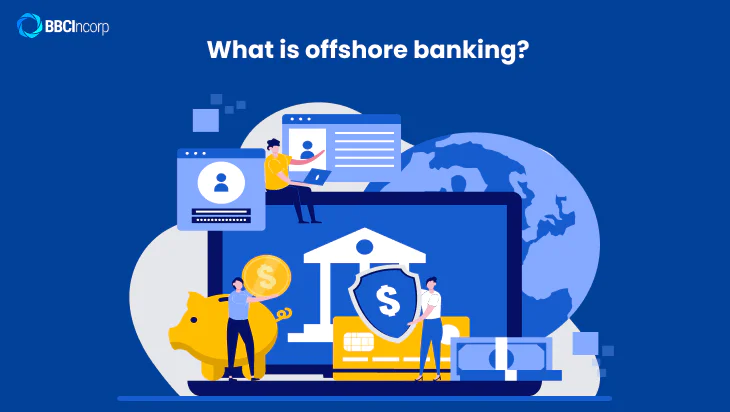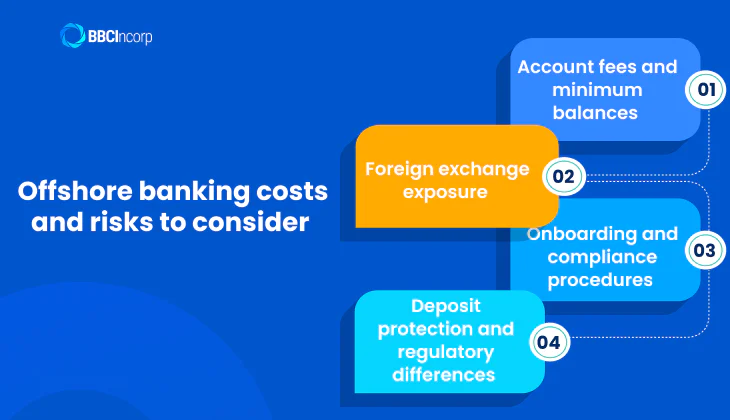
Table of Contents
Offshore banking offers various financial solutions for businesses and high-net-worth individuals operating in an increasingly globalized economy. The benefits of offshore banking extend beyond conventional account management, providing enhanced privacy, asset protection, and seamless access to international markets. These accounts support optimized tax planning, multi-currency flexibility, and diversified investment strategies, enabling more effective wealth and risk management.
In this article, we examine the key benefits of offshore bank accounts, demonstrating how they complement domestic banking systems while enhancing operational efficiency, financial security, and long-term planning for global businesses.
- Tax benefits: Offshore bank accounts can provide tax advantages, such as reduced tax liability or tax deferral, depending on the jurisdiction and your financial situation.
- Asset protection: Holding assets offshore can protect them from legal claims, political instability, and economic fluctuations in your home country.
- Convenience: Most offshore banks offer convenient international banking services, allowing you to manage your finances across borders with ease.
- Security: Offshore banks often operate in stable and well-regulated jurisdictions, offering a secure environment for your funds.
- Privacy: Many offshore jurisdictions prioritize the client’s confidentiality, so your financial information remains private and secure.
- Higher interest rates: Offshore accounts may offer higher interest rates compared to domestic accounts, potentially increasing your returns.
- Currency diversification: You can hold multiple currencies in offshore accounts, helping you manage currency risk and diversify your holdings.
- Investment opportunities: Offshore accounts can provide access to international investment opportunities, expanding your portfolio options.
- Geographic diversification: Spreading assets across multiple jurisdictions reduces exposure to country-specific risks and enhances operational and financial flexibility.
- Estate & wealth planning: Offshore banking supports structured wealth management, including succession planning and asset consolidation, at the same time, leverages favorable regulations in jurisdictions like Singapore and Hong Kong.
What is offshore banking?
Offshore banking is the practice of opening and maintaining a bank account in a country outside your place of residence or business. These accounts allow clients to manage finances internationally, operate in multiple currencies, and diversify assets efficiently.

The benefits of offshore banking include enhanced financial privacy, legal asset protection, and potential tax efficiency in compliant jurisdictions. Offshore accounts also provide global accessibility, making cross-border transactions faster and easier. This is particularly valuable for entrepreneurs with international operations.
Furthermore, although offshore banking offers significant advantages, it is crucial to comply with international reporting standards such as FATCA and CRS to ensure the legality of the business. Properly structured offshore accounts allow individuals and companies to leverage global financial systems safely, enhancing flexibility, security, and long-term growth potential.
What are the 11 benefits of offshore bank accounts?
Not only does an offshore bank account benefit individual account holders, but it acts as a powerful means of protection and convenience for offshore businesses. Why should you set up an offshore bank account? Let’s find out right below.
Tax optimisation
Offshore bank accounts in tax-efficient jurisdictions can offer meaningful advantages, including reduced tax rates or exemptions on certain types of income. This allows individuals and businesses to protect their assets and retain more profits while staying compliant with their home country’s laws.
Using offshore banking for strategic tax planning is entirely legitimate, provided all local and international regulations are observed. You must avoid any practices that could be construed as tax evasion.

The effectiveness of tax optimisation depends on factors such as your tax residency and the nature of your income. In many cases, disclosure of foreign accounts or assets, such as filing Form 8938 for specified foreign financial assets, may be required.
| Tax Benefit | Meaning | Jurisdictions applied |
| Lower Corporate Tax Rates | Low or no corporate income tax, helping businesses retain more profits | Singapore, Hong Kong, BVI, Cayman Islands |
| Tax Deferral on Capital Gains | Deferral of taxes on foreign investment gains, depending on residency and local rules | United Arab Emirates, Singapore |
| Estate Planning & Inheritance | Offshore trusts or foundations preserve family wealth and may reduce inheritance tax exposure | Jersey, Cayman Islands |
| Tax-Exempt Passive Income | Interest, dividends, or royalties may be tax-exempt for non-residents, often using IBCs | Bahamas, Bermuda, Belize |
| Double Taxation Treaties | Prevents the business from being taxed twice on cross-border income, such as dividends, interest, and royalties. | Varies by treaty |
Asset protection
One highly effective method for safeguarding your assets is to relocate them beyond the borders of your home country. In various nations, the banking systems might lack the robust safeguards necessary to protect the wealth and assets held by account holders. This vulnerability extends to businesses, which could face substantial risks as a result.
Thankfully, offshore bank accounts can offer a reassuring level of security. This is particularly true when these accounts are established in jurisdictions known for their transparency, stringent regulations, and robust privacy laws like Hong Kong, Singapore, or the British Virgin Islands.
For instance, opening a bank account in Singapore fosters the safety of your assets, as it prioritizes stringent privacy laws to protect your financial interests.

Note that
Offshore banking does not grant absolute protection from lawful court orders. The level of asset protection depends on the legal structure you use, the jurisdiction holding your assets, and the laws that apply to those assets or counterparties. You still need proper planning and guidance from expert service providers like BBCIncorp for effective protection.



Convenience
Offshore bank accounts are renowned for their convenience, particularly for individuals or businesses with international operations.
The primary advantage lies in their global accessibility. Regardless of your location or time zone, offshore bank accounts offer account holders uninterrupted access to their funds. This flexibility is especially beneficial for frequent travelers or those engaged in cross-border business transactions.
Moreover, many reputable banks situated in well-established offshore financial centers, such as Belize, facilitate remote account registration. This means you don’t need to reside near a physical branch of the bank to open and manage your offshore account, streamlining the process further.
In addition to this accessibility, offshore bank accounts provide a comprehensive range of banking services akin to those found in local or international banks in your home country. These services include:
- Personalized banking solutions
- 24/7 internet banking access
- Debit and credit cards
- Access to extensive ATM networks; and
- Other features designed to meet your financial needs.
Security
For many offshore account holders, the primary attraction lies in the level of security offered. In countries marked by uncertain and unfavorable economic conditions, along with recurring risks like asset seizures, high inflation rates, financial instability, or other financial hazards, concerns about the safety of your bank account can become a pressing issue.
In contrast to accounts held in your home country, an offshore bank account, especially when established in a reputable and efficiently regulated jurisdiction, offers a significantly higher degree of security.
This additional layer of protection serves as a safeguard for your funds, shielding them from the risks and uncertainties previously mentioned.
Feel free to explore the top 9 countries with the best offshore bank accounts when you’re ready.
Privacy
Many offshore jurisdictions have established stringent laws regarding corporate and banking confidentiality. These regulations are designed to prioritize and maintain the anonymity of account holders.
Belize is particularly renowned as one of these well-known jurisdictions with a high level of privacy for offshore bank accounts.
Note that any behaviors violating the laws will be deemed criminal offenses and can lead to serious consequences of penalties, or even imprisonment unless there are enforcements from the relevant authority.
Higher interest rates
Offshore banks often provide the advantage of offering higher interest rates on your savings compared to those available in your home country.
One effective approach to securing a favorable interest rate for your offshore bank account is by opting for a long-term account. This means committing your funds to the account for an extended period, which can result in more attractive interest rates and potentially greater financial gains over time.
By taking this strategic approach, you can optimize the benefits of offshore bank accounts while ensuring your money grows more effectively.

Currency diversification
Offshore banking allows you to maintain a diverse currency portfolio within your offshore accounts. In simpler terms, you can hold multiple currencies in your accounts and conduct transactions in various currencies.
This approach serves as a shield against the impact of currency fluctuations, which are often more pronounced in your home country. In essence, it helps insulate your account from the effects of currency volatility that might otherwise affect your domestic finances.
Example: Several expat and offshore banking platforms let you hold savings or time deposits in 16 to 19 currencies and manage foreign exchange directly through their mobile apps.

Investment opportunities
One significant advantage of offshore banking is the reduced government intervention typically found in offshore financial centers. This means that account holders enjoy greater access to a wide range of investment and fund opportunities.
In many cases, you may encounter various regulations that limit the investment options available to residents in their home countries.
However, offshore accounts provide entrepreneurs and investors with a high degree of flexibility, opening up a multitude of possibilities to access international markets and diversify their investment portfolios.
This flexibility empowers individuals to explore and capitalize on investment opportunities beyond the confines of their domestic regulatory constraints.
Delaware is considered an ideal destination for businesses seeking investment and fundraising. However, opening an offshore bank account in Delaware can be complicated and troublesome for a non-resident.
Let’s get familiar with the common banking solutions for Delaware companies in our article.

Geographic diversification
One of the most practical benefits of offshore banking is the ability to spread assets across multiple financial centers. Beyond holding several currencies, this allows businesses and individuals to access stable, well-regulated banking jurisdictions, enhancing operational continuity and financial resilience.
In particular, entrepreneurs can optimize treasury management by positioning funds closer to target markets or supply chains, while investors can balance portfolios across jurisdictions. Simply put, geographic diversification simplifies cross-border operations and provides flexibility to respond quickly to market opportunities.

Estate and wealth planning
Offshore banking offers robust support for estate and wealth planning when combined with structures like trusts, foundations, or holding companies. These arrangements centralize ownership, separate personal and business assets, and manage succession planning for families or business groups.
Key benefits of offshore banking here include enhanced asset protection, privacy, and continuity in wealth transfer. Certain jurisdictions provide favorable trust laws and predictable administration to preserve long-term financial goals. With proper legal and tax planning, offshore banking allows high-net-worth individuals and families to manage intergenerational wealth efficiently and maintain control over distribution.

Access to global markets
Offshore bank accounts make international business and investment more seamless. They provide direct access to global payment networks, multiple currency holdings, and specialized investment opportunities not available domestically.
Businesses can streamline cross-border transactions, optimize currency management, and improve liquidity for international operations. Individuals gain flexibility for global investments, portfolio diversification, and easier management of royalties, dividends, or interest income.
Among the top benefits of offshore banking are faster cross-border payments, efficient currency conversion, and enhanced access to international financial services. Furthermore, you can diversify by jurisdiction: spreading cash across stable financial centers to reduce single-country risks such as capital controls, political shocks, or prolonged banking disruptions.
Compliance & Reporting: Key Considerations
Although offshore banking offers numerous advantages, account holders must adhere to legal reporting requirements. Non-compliance can result in substantial penalties, including fines and legal actions.
Below are the key considerations to ensure your offshore accounts remain fully compliant:
Common Reporting Standard (CRS / AEOI)
- Who must report: Financial institutions in participating jurisdictions
- What is reported: Bank accounts, investment accounts, and certain insurance products
- Thresholds: Applies to all account holders with taxable residency in CRS-participating countries
- Purpose: Automatic exchange of financial information between countries to prevent tax evasion
- Penalties: Vary by jurisdiction; failure to report may result in fines and regulatory sanctions
FBAR (FinCEN Form 114)
- Who must report: U.S. citizens, residents, and entities with foreign financial accounts
- What is reported: All foreign bank and financial accounts, including joint accounts
- Thresholds: Aggregate value exceeds $10,000 at any time during the calendar year
- Purpose: U.S. Treasury requirement to disclose foreign accounts and prevent tax evasion
- Penalties: Civil penalties up to $10,000 per non-willful violation; willful violations can exceed $100,000 or 50% of account balances
FATCA (Form 8938)
- Who must report: U.S. taxpayers, including citizens and residents
- What is reported: Specified foreign financial assets such as bank accounts, investment accounts, foreign entity interests, and certain insurance contracts
- Thresholds: Depends on filing status and residency, e.g., $50,000 for single filers in the U.S., higher for those living abroad
- Purpose: Making sure that U.S. taxpayers declare foreign assets separate from FBAR
- Penalties: Initial penalty $10,000 for non-compliance; additional fines for continued failure as well
Staying compliant with regulations is key to getting the most benefits out of offshore banking and avoiding legal or financial trouble, so it’s important to thoroughly review all relevant rules.
Offshore banking costs and risks to consider
The benefits of offshore banking are substantial, yet careful consideration of fees, compliance, and currency risks is necessary.

Account fees and minimum balances
Banks in offshore jurisdictions such as Singapore and Hong Kong require minimum deposits ranging from USD 5,000 to USD 50,000. Monthly or annual maintenance fees may apply, and international wire transfers typically incur additional costs depending on the bank and destination.
Foreign exchange exposure
Holding assets in multiple currencies exposes accounts to exchange rate fluctuations. For instance, USD holdings may decline in value relative to EUR or JPY if market rates shift, which can impact overall returns on international portfolios.
Onboarding and compliance procedures
Offshore banks implement strict KYC and enhanced due diligence processes. Corporations, trusts, and high-net-worth individuals may experience account approval timelines of several weeks due to detailed documentation and verification requirements.
Deposit protection and regulatory differences
Deposit insurance coverage varies by jurisdiction. Singapore protects deposits up to SGD 75,000 per depositor per bank. On the other hand, Jersey applies the Deposit Compensation Scheme, which offers different limits.
This overview highlights key considerations, but for comprehensive guidance and support on your specific situation, it’s advisable to consult the BBCIncorp team for practical advice.
When an offshore account becomes the better choice
Offshore bank accounts become particularly advantageous in practical scenarios where traditional domestic banking may limit flexibility. Expats and frequent travelers benefit from multi-currency accounts, which hold, send, and receive funds in major currencies such as USD, EUR, GBP, or SGD. For instance, a Singapore-based professional working across Asia can use a Singapore trust fund account to manage salary and investments without incurring excessive conversion fees.
Businesses with international operations also gain efficiency by receiving payments in multiple currencies directly, reducing transfer times and costs. A Hong Kong-based trading company, for example, can consolidate payments from clients in Europe, the U.S., and Southeast Asia, which helps with cash flow management.
Investors seeking access to global investment products, such as international bonds, mutual funds, or specialized derivatives, tend to find offshore accounts necessary to participate in opportunities unavailable domestically. In these contexts, offshore banking offers operational ease, global reach, and currency flexibility.
Clearing up misconceptions about offshore banking
It is important to recognize that offshore banking is fully legal. Misconceptions often link it to criminal activity, money laundering, or illegal tax evasion. In reality, using offshore bank accounts complies with the law in most jurisdictions worldwide.
When used appropriately, offshore banking provides numerous advantages for individuals, investors, SMEs, and startups. It offers tools to manage multiple currencies, protect assets, optimize taxes within legal frameworks, and facilitate international transactions. Responsible utilization of these advantages enables investors and businesses to boost financial efficiency, facilitate cross-border activities, and foster sustainable expansion, all while maintaining compliance with legal requirements.
To conclude
Opening an offshore bank account can provide considerable advantages, including strengthened asset protection, broader access to international markets, and the ability to hold multiple currencies efficiently. Equally important is evaluating your financial goals and selecting a jurisdiction that matches your needs. Careful planning allows you to leverage the benefits of offshore banking effectively and, at the same time, stay in compliance with the law.
At BBCIncorp, we provide expert company services to help you open your business offshore banking account in Hong Kong, Singapore, the BVI, Belize, and other key jurisdictions. Don’t hesitate to send us an email at service@bbcincorp.com for personalized support in your situation. Our specialists are ready to provide the insights you need: incorporation, banking, annual reports, accounting, and more.
Frequently Asked Questions
Is offshore banking legal?
Offshore banking is fully legal when used for legitimate purposes and in compliance with applicable laws. Individuals and businesses must adhere to reporting and disclosure requirements, such as the Common Reporting Standard (CRS) for participating jurisdictions, and local tax obligations. Illegal activities like tax evasion, money laundering, or fraud remain prosecutable regardless of account location.
Offshore accounts are widely used by multinational companies, expats, and investors to manage finances, hold multiple currencies, and facilitate cross-border transactions legally. Once you select a reputable bank and jurisdiction, your offshore account can operate within regulatory frameworks, and provide financial efficiency.
Do I always get higher interest rates offshore?
Higher interest rates are not guaranteed in offshore accounts. Rates vary depending on the bank, product type, and local market conditions. Although some offshore jurisdictions may offer more competitive returns than domestic accounts, fees, minimum deposits, foreign exchange exposure, and deposit protection schemes must be considered.
For example, an account in Singapore may offer moderate interest but provides strong regulatory protection, whereas a high-interest account in a smaller jurisdiction may carry higher risks.
You should compare rates alongside operational costs and currency risk to make sure you choose what aligns with your financial objectives without assuming guaranteed returns.
Do I need to report my offshore account?
Yes, reporting is required in most cases. For U.S. persons, foreign accounts may need disclosure under both the FBAR (FinCEN Form 114) if aggregate balances exceed $10,000 and Form 8938 under FATCA if specified thresholds are met. Other jurisdictions participating in the Common Reporting Standard (CRS) automatically exchange financial information with tax authorities.
Non-compliance can lead to significant penalties, so businesses must report properly and stay in good standing. Thus, accurate record-keeping of account balances, income, and transactions is essential to fulfill all disclosure obligations in your country of residence or tax liability.
How is “privacy” different from “secrecy”?
Privacy refers to the protection of client data under banking and local laws, ensuring that sensitive financial information is handled confidentially. Secrecy implies withholding information, which is illegal in most regulated jurisdictions. Offshore banks comply with international reporting standards like CRS and AEOI, sharing account details with tax authorities where required.
True privacy means your information is protected from public access or unauthorized parties, but it does not exempt you from legal reporting obligations.
Do offshore bank accounts get taxed?
Yes, they do. Offshore accounts do not remove tax obligations in your home country. Any interest, dividends, or capital gains earned are generally taxable according to local tax laws.
Legal compliance requires reporting income from foreign accounts to your domestic tax authority, using forms such as Form 8938 for U.S. taxpayers or similar declarations in other countries.
Offshore accounts provide the opportunity for lawful tax planning, such as deferring certain taxes or optimizing structures, but all earnings must be declared to avoid penalties. Tax rates, exemptions, and reporting rules depend on the jurisdiction where you reside and your specific account type.
Why do people put their money in offshore bank accounts?
Individuals and businesses use offshore accounts to manage international finances, hold multiple currencies, and streamline cross-border transactions. They offer asset protection from political, legal, or economic risks in the home country, which then allows access to investment products, tailored corporate services, and global payment systems unavailable domestically.
Additionally, lawful tax optimization, estate planning, and succession management are more flexible when combined with trusts, foundations, or holding companies in certain jurisdictions like Singapore or Hong Kong. The benefits of offshore banking support operational efficiency for global businesses legally and efficiently.
Disclaimer: While BBCIncorp strives to make the information on this website as timely and accurate as possible, the information itself is for reference purposes only. You should not substitute the information provided in this article for competent legal advice. Feel free to contact BBCIncorp’s customer services for advice on your specific cases.
Industry News & Insights
Get helpful tips and info from our newsletter!
Stay in the know and be empowered with our strategic how-tos, resources, and guidelines.





